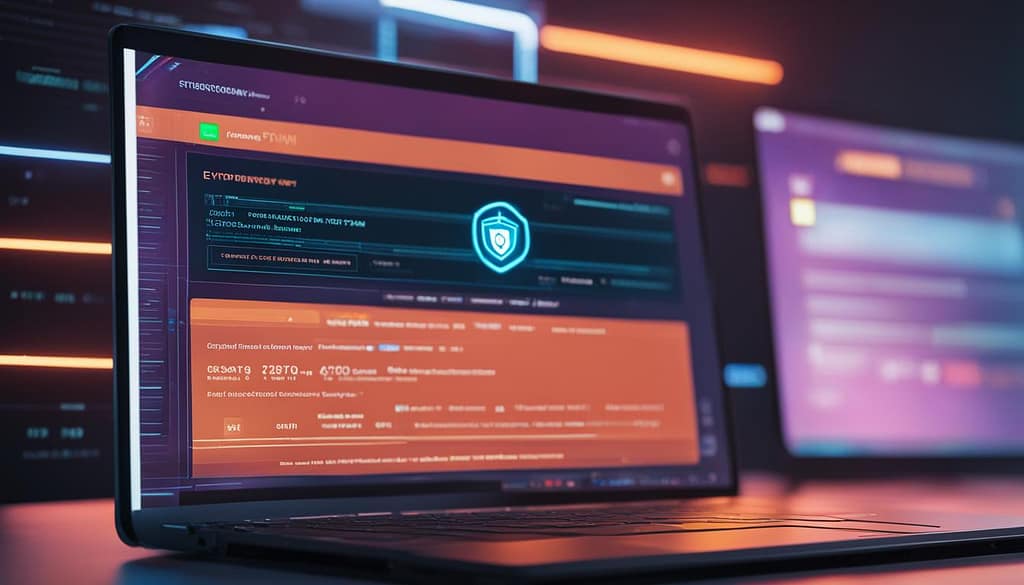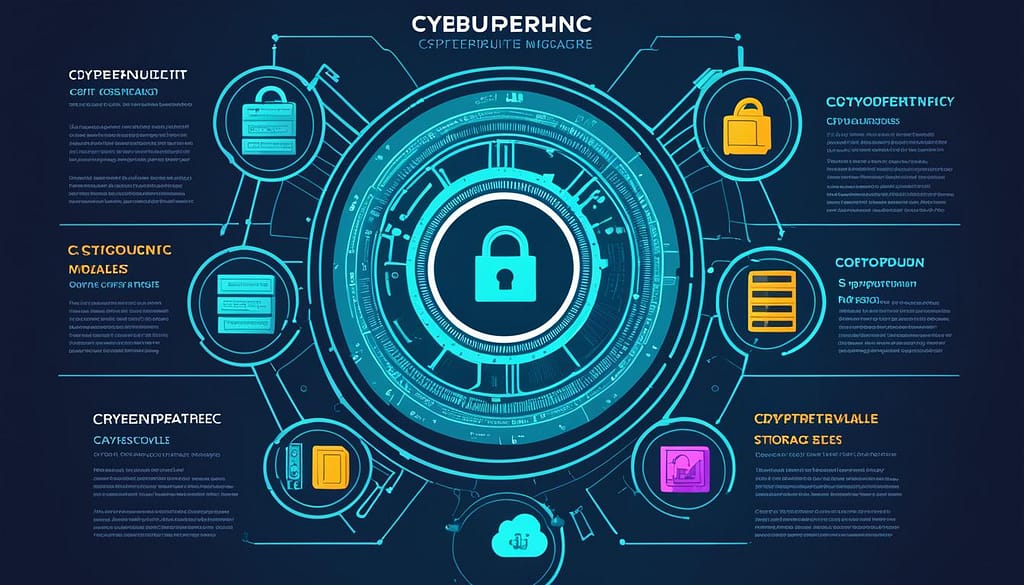Top Security Practices for Cryptocurrency Investors
As the allure of cryptocurrencies continues to captivate the imagination of Canadian investors, the importance of implementing stringent cryptocurrency security measures increasingly comes to the forefront. With assets such as Bitcoin and Ethereum offering potentially substantial returns, investors are focusing more than ever on safeguarding assets and ensuring their financial ventures remain secure in the dynamic realm of digital currencies. Acknowledging the risks inherent in these transactions, the need for sophisticated investment security protocols that effectively shield digital wealth from cyber threats has never been more pronounced. In light of this, investors must navigate the landscape with a judicious mix of caution and informed confidence to protect their interests.
Adopting a holistic approach to security is vital, as cryptocurrencies are not protected by FDIC insurance, meaning that a considerable loss could occur without the right precautionary measures. The steps investors take today can significantly influence the resilience of their digital portfolios. Hence, mastering the intricacies of secure investment practices stands as an essential skill for participation in today’s crypto market.
Key Takeaways
- Essentiality of robust cryptocurrency security in the current investment environment.
- The critical role of comprehensive safeguarding assets for investor peace of mind.
- Understanding the unique challenges in investment security without traditional FDIC insurance.
- Importance of employing a full spectrum of preventive measures to secure digital wealth.
- Necessity of making informed, security-conscious decisions in the realm of cryptocurrency trading and storage.
Understanding Cryptocurrency Investment Risks
The burgeoning domain of cryptocurrencies presents opportunities for substantial profits but equally harbors numerous risks, which must be meticulously understood and navigated by investors. Unlike conventional banking systems and their associated protections, the realm of digital currencies introduces a new paradigm where safety nets like FDIC insurance are absent, thereby placing a greater onus on investors for their asset security.
The Reality of Non-Insured Digital Assets
In the volatile terrain of digital currencies, the assurance of asset recovery following a breach is not guaranteed. This harsh reality stands in stark contrast with traditional financial structures backed by insurance mechanisms, often catching unprepared investors off-guard. The inherent predisposition of cryptocurrencies as non-insured assets necessitates investor diligence to compensate for this lack of a safety net.
Potential for High Rewards and Associated Digital Threats
Attraction to cryptocurrencies is undoubtedly fueled by their potential for high returns. However, this lure should not overshadow the importance of acknowledging and preparing for significant **cryptocurrency risks**, which include possible digital threats to investor assets. The digital nature of these transactions and storage methods demands ever-evolving vigilance and robust **digital asset security** measures.
Regulatory Landscape and Compliance Necessities
Investors must traverse the labyrinthine **cryptocurrency regulations** which, while designed to act as safeguards, also add layers of complexity to the investment process. Navigating these regulatory requirements is crucial for investment legitimacy and **security**. Compliance with U.S. laws affecting taxation and transactions can not only confer a sense of protection but also insulate investors from inadvertent legal predicaments.
Understanding and adherence to cryptocurrency laws and guidelines are, therefore, indispensable for responsible investing and the fortification of digital holdings against foreseeable and cryptic tribulations.
| Aspect of Risk | Relevance for Investors | Preventive Measures |
|---|---|---|
| Non-Insured Nature | Assets are not federally insured, raising stakes on personal security efforts. | Utilize cold wallets and diversify holdings across platforms. |
| Digital Threats | High susceptibility to breaches and cyberattacks. | Implement multi-factor authentication and regular security audits. |
| Regulatory Compliance | Must comply with laws governing taxes and trading to avoid legal issues. | Stay informed on legislation changes and work with compliance experts if necessary. |
Investment in cryptocurrency undeniably brings a heightened need for self-reliance and an acute understanding of the associated risks. By preparing for the inherent volatility and establishing stringent security protocols, investors can approach the digital asset landscape with a strategic and informed posture.
Establishing Secure Exchanges for Buying Cryptocurrency
In the fast-growing world of cryptocurrencies, the significance of secure cryptocurrency exchanges cannot be understated. Investors on the lookout for reliable digital investment platforms should prioritize exchanges that have a reputation for safeguarding assets effectively. Renowned exchanges like Coinbase, Crypto.com, and Kraken have set industry standards by implementing a multitude of security measures.
These top-tier platforms utilize cold storage for a substantial part of the investors’ funds, ensuring that assets are kept offline and away from potential online vulnerabilities. Moreover, they’ve adopted advanced server security practices that include comprehensive physical surveillance and meticulous access controls operating 24/7. Such stringent security protocols significantly diminish the likelihood of any successful cyber attack on the exchanges.
It’s reassuring for investors to know that, on the off-chance of a security compromise, these well-established exchanges typically offer reimbursement plans. These plans are a testament to the exchanges’ commitment to user security and their confidence in their protective measures. Additionally, the implementation of two-factor authentication (2FA) further solidifies the barriers against unauthorized access to user accounts.
| Exchange | 2FA Support | Cold Storage | User Reimbursement Policy |
|---|---|---|---|
| Coinbase | Yes | Yes (98% of funds) | Insurance policy for digital currency losses |
| Crypto.com | Yes | Yes (100% of funds) | $100M policy against physical damage or third-party theft |
| Kraken | Yes | Yes (95% of funds) | Discreet reimbursements case by case |
As digital currencies continue to attract global investment, choosing a secure exchange platform must remain a top consideration for every savvy investor. The peace of mind coming from using a platform that furnishes both security and stability is invaluable in this burgeoning yet volatile market.
Mastering Wallet Security: A Priority for Investors
The realm of digital currencies demands rigorous security measures, particularly in the management of cryptocurrency wallets. As investors delve deeper into the cryptosphere, the sanctity of wallet security becomes non-negotiable, thus understanding and adopting optimal practices for safeguarding assets is imperative.
The Significance of Private Keys in Cryptocurrency Security
Integral to cryptocurrency wallet security is the protection of private keys, the alphanumeric strings that authorize transactions and afford users unmediated access to their digital wealth. The confidentiality and integrity of these keys are paramount, as their exposure can result in irretrievable loss of funds. Therefore, investors are encouraged to pursue robust management strategies for their private keys, shielding them from the prying eyes of cybercriminals.
Advantages of Cold Storage Solutions
Among the vanguard of private keys protection strategies is the utilization of cold storage solutions. Such solutions include hardware wallets like Ledger and Trezor, which offer investors peace of mind by keeping their private keys completely air-gapped from the online environment. Cold storage benefits manifest in reduced risk of remote hacking attempts, presenting a formidable barrier against unauthorized access.
Comparing Hot and Cold Wallets
Recognizing the distinct features of hot and cold wallets is critical for an investor’s strategy. Hot wallets, always connected to the internet, afford convenience and fluidity in transactions. However, they are invariably more vulnerable to security breaches. Conversely, cold wallets offer robust quarantine from the web, significantly enhancing blockchain asset protection. The judicious evaluation of each type’s merits and demerits will inform investors’ choices, striking a balance between accessibility and security of their cryptocurrency portfolio.
- Accessibility: Hot wallets provide rapid access for day-to-day transactions, while cold wallets are better suited for long-term holding.
- Security Level: The inherent online exposure of hot wallets elevates risk, whilst cold storage benefits from being impregnable to online attacks.
- Usage Convenience: Hot wallets facilitate ease of use with user-friendly interfaces, as opposed to the more process-intensive cold wallets.
Two-factor Authentication: Your Digital Bodyguard
In the rapidly evolving world of digital currency, two-factor authentication (2FA) stands as a bastion of protection for your cryptocurrency investments. As attacks become more ingenious, the implementation of multiple digital security layers is not just advisable—it’s imperative for anyone serious about safeguarding their digital assets.
Two-factor authentication acts as an additional checkpoint, effectively placing a barrier between your sensitive information and those who may attempt to compromise it. This robust form of cryptocurrency protection enforces a dual-lock mechanism, ensuring that one method of access alone is insufficient to unlock the doors to your digital vault.
- **Password Alone Is Not Enough**: Despite a complex password, it’s the second layer of 2FA which often rebuffs invasion attempts.
- **Mobile Verification**: A code sent to your mobile phone adds a personal, in-hand validation step—taking advantage of something you have with you regularly.
- **Reduced Risk of Unauthorized Access**: Even if one factor is compromised, unauthorized users are stalled at the second gate, protecting your account.
Adopting two-factor authentication is a clear step forward in strengthening your defense against cyber threats. With security breaches becoming more sophisticated, the additional time it takes to authenticate via 2FA is minimal compared to the protection it offers.
Remember, in the digital world, convenience should never trump security—2FA is your ally in the pursuit of uncompromised digital sovereignty over your investments.
Acting now to activate two-factor authentication on all your accounts, especially those related to cryptocurrency transactions, is a strategic move for anyone who values the integrity of their digital assets.
Implementing Strong Password Protocols
In the world of cryptocurrency security, the strength of a user’s password can often be the first line of defense against unauthorized access and potential breaches. As cryptocurrencies operate in a digital space without physical barriers, exercising rigorous password protocols becomes not just a precaution but a necessity for investors. To fortify accounts against the myriad of cyber threats, one must not only create but also properly manage passwords that are resilient against cracking attempts.
Creating and Managing Robust Passwords
Crafting robust passwords involves more than just combining letters and symbols. Effective password management is foundational to cryptocurrency security, requiring a strategic approach to both creation and maintenance. For instance, passwords should include a mix of uppercase and lowercase letters, numbers, and symbols to enhance complexity. Furthermore, employing different passwords for each digital platform is critical in ensuring that a breach in one service does not compromise all other accounts.
Advantages of Using a Password Manager
Even the most complex passwords can be a vulnerability if they are reused across multiple sites or if they are not stored securely. This is where the integration of a trustworthy password manager becomes advantageous. These tools help in generating strong, unique passwords while also securely storing them, thus, allowing users to have an individual password for each service without the need to memorize every single one. Most importantly, a high-quality password manager contributes significant value in bolstering strong password protocols within the context of cryptocurrency security.
Changing Passwords: A Routine for Security
Maintaining a routine of regularly updating passwords is a vital part of an investor’s security regimen. Changing passwords periodically—especially in the aftermath of a security alert—reduces the window of opportunity for cybercriminals to exploit potentially compromised credentials. This practice is instrumental in preempting unauthorized access, thus enhancing overall account security. Establishing a schedule for predictable password updates can significantly reduce the chances of a security lapse in the dynamic sphere of cryptocurrency investment.
Strategies for Cryptocurrency Storage Diversification
In a sphere where the protection of digital assets is paramount, cryptocurrency storage diversification stands out as an essential risk mitigation strategy. For investors looking to bolster their defenses against the volatility and threats within the crypto market, having a multifaceted approach for storing assets ensures a lower risk of total loss from any single point of failure. In this section, we delve into how splitting holdings can safeguard a portfolio and the importance of maintaining ease of access while upholding security.
How Diversification Minimizes Risk
Employing a strategy that involves minimizing risk through diversification is analogous to not putting all one’s eggs in one basket. Within the cryptocurrency ecosystem, this means distributing investments across different types of wallets and platforms. The rationale behind this is straightforward: if one storage solution becomes compromised, the damage is contained and does not extend to your entire digital wealth.
Imagine a potential scenario where a hot wallet, while convenient for regular transactions, becomes susceptible to online threats. If the investor’s assets are spread across other mediums, such as hardware or paper wallets, the risk exposure of the hot wallet becomes a smaller fraction of their total holdings. This proactive approach for secure portfolio management is not just a technique but a fundamental safety net for the savvy investor.
Balancing Security with Portfolio Management
While diversification is an effective measure to counteract risks, it comes with the added complexity of managing multiple storage solutions. The key to success lies in striking a balance—managing a portfolio effectively without compromising on security. Investors must consider both the quantity and accessibility of their crypto assets when determining the best storage combinations.
For those assets seldom transacted or held as a long-term investment, cold storage offers peace of mind with its offline nature. By contrast, assets needed for trade or active portfolio reshuffling could be kept in more accessible, albeit less secure, hot wallets. What remains important is that multiple storage mediums co-exist in an investor’s arsenal, allowing them not only to react quickly to market shifts but also to sleep well at night, knowing their diversified storage approach reinforces their crypto defenses.
In conclusion, cryptocurrency storage diversification is more than a preventative measure—it is an investment philosophy that upholds the tenets of minimizing risk and maximizing opportunities for growth through secure portfolio management. With careful planning and a nuanced understanding of various storage solutions, investors can protect their digital fortunes while navigating the ever-evolving world of cryptocurrency.
Cryptocurrency Security: Recognizing and Preventing Phishing Scams
In a digitized world where cryptocurrency security is paramount, the rise of phishing scams has become a significant threat to protecting digital investments. Armed with deceptively authentic-looking emails and websites, cybercriminals aim to exfiltrate sensitive information such as login credentials and private keys. Understanding the earmarks of these scams is your first line of defence. A commonality of phishing attempts is the call-to-action that urges immediate action, preying on the fear of missing out or the fear of account issues.
Considering that avoiding phishing scams is crucial in safeguarding your assets, let’s enumerate some measures to avoid these deceitful tactics:
- Always verify the website’s address before entering any login information.
- Look for misspellings or unusual domain names.
- Be wary of unsolicited requests for personal information or financial transactions.
- Employ the use of a trusted antivirus and firewall to block known phishing sites.
- Utilize browser extensions that offer an additional layer of security against phishing.
Remember, no reputable company will ever ask for your private keys or passwords via email.
As an additional resource, a comparison table of best practices and common phishing tactics might help in understanding how to navigate this digital minefield effectively. Educating yourself about these threats will enable you to recognize phishing attempts and take action to protect your digital investments.
| Phishing Tactic | Best Practice to Counteract | Reasoning |
|---|---|---|
| Emails with unauthorized attachments | Never open unexpected attachments | These could contain malware intended to steal information |
| Links to imitation websites | Directly type in the trusted URL | Prevents redirection to malicious sites |
| Communications requesting private information | Directly contact the company via official channels | Ensures you’re engaging with a legitimate representative |
In summary, cryptocurrency security is an evolving challenge that requires constant vigilance. Spotting and avoiding phishing scams is an essential skill in protecting digital investments. By staying informed and following recommended security protocols, you can significantly reduce the risk to your digital assets and maintain peace of mind in the fast-paced world of cryptocurrency.
Educational Resources for Secure Cryptocurrency Investment
In an ever-evolving digital economy, the significance of cryptocurrency investment education cannot be overstated. For investors, the first line of defence against potential threats is knowledge. Emphasizing education empowers individuals to make informed decisions, bolstering their confidence in maneuvering through complex investment landscapes.
Staying Informed on Current and Emerging Threats
To maintain a robust security posture, one must be agile and receptive to security threat awareness. This entails subscribing to credible news feeds, participating in webinars, and even attending seminars dedicated to digital asset security. Recognizing the patterns of cyber threats enables proactive measures and timely responses to protect valuable investments.
Learning from Past Security Breaches in the Crypto World
One of the most potent forms of education comes from analyzing historical data—learning from breaches that left noticeable imprints on the industry. Case studies of past incidents provide insights that are crucial in understanding how to fortify security measures and prevent similar lapses. Transparency in reporting and deconstructing these events is invaluable for institutional and retail investors alike.
It is through a combination of real-time updates and reflective learning that the cryptocurrency community can champion a culture of rigorous security. As we stride forward, striking a balance between technological advancement and investment safety is key to fostering a resilient and trustworthy digital asset environment.
Optimizing Network Protection for Cryptocurrency Transactions
In the realm of digital currency, network protection is not just an option but a necessity for conducting secure cryptocurrency transactions. The responsibility for safeguarding these transactions is shared between cryptocurrency companies and individual investors. It is imperative that both parties employ robust cybersecurity measures, integrating the latest technological advancements to strengthen their defense against cyber-attacks.
Advanced cryptographic algorithms are fundamental in securing the blockchain networks at the heart of cryptocurrency exchanges. These algorithms ensure the confidentiality and integrity of transactions, building a resilient structure against potential security breaches. Moreover, network monitoring serves as a continuous safeguard, scrutinizing system activity to detect and thwart malicious actions promptly.
Cybersecurity isn’t just about reacting to threats—it’s about proactive prevention. That’s where firewalls and regular risk assessments come into play. These critical elements serve as the vanguards of network security, meticulously filtering traffic to prevent unauthorised intrusions and routinely examining potential vulnerabilities that could be exploited by sophisticated cyber criminals.
- Firewalls configured to protect against unauthorized access and intrusions
- Regular security audits to identify and rectify exploitable vulnerabilities
- Continuous network monitoring to detect abnormal activities in real-time
- Use of VPNs and encrypted communication channels for secure data transmission
The introduction of these cybersecurity measures translates into fortified platforms, capable of resisting not just common attacks but also sophisticated, emerging threats. With the ever-evolving landscape of cyber threats, maintaining a robust security posture is crucial for the longevity and trust in the cryptocurrency market. Business leaders and investors must understand that security is an ongoing process, necessitating a progression of defenses to align with the dynamic nature of cyber risks.
Ultimately, network protection plays a pivotal role in the broader scope of a secure digital economy. Embracing a comprehensive security strategy ensures that the underlying infrastructure supporting cryptocurrency transactions remains unwavering, thus safeguarding investor assets and sustaining confidence in this innovative financial ecosystem.
Conclusion
In the dynamic realm of cryptocurrency investments, adopting a holistic security strategy is more than a mere suggestion—it’s a necessity. This article has detailed an array of best security practices that are instrumental in safeguarding digital assets. By choosing secure exchanges, leveraging hardware wallets for cold storage, enabling two-factor authentication, and creating robust password protocols, investors can form a sturdy defense against the relentless tide of digital threats.
A Recap of Best Security Practices for Investors
Let’s recapitulate: best security practices are pivotal to the integrity of your investments. A prudential approach combines the strength of secure exchanges with the impenetrability of hardware wallets like Ledger and Trezor. Two-factor authentication becomes your unremitting sentinel, and meticulously crafted password protocols your first line of defence. An astute investor never underestimates the potency of these shields in the face of adversity.
Emphasizing the Continuous Evolution of Security Measures
The landscape of cyber threats is continually evolving, growing more sophisticated with each passing day. Therefore, it is incumbent upon the investor to remain abreast of the latest developments in digital asset protection. Continuous education and adaptation are not merely beneficial—they are the cornerstones of maintaining optimal security in an ever-shifting digital terrain. Meaningful protection requires vigilance and an unwavering commitment to evolutionary security measures.
Final Thoughts on Safeguarding Cryptocurrency Investments
In conclusion, while technological strides are propelling the cryptocurrency sector forward, they are concurrently amplifying the capabilities of cyber adversaries. This calls for a strategy that is adaptive and resilient, one that shields your digital assets and repels the attempts of those who seek unauthorized access. Savvy investors understand the importance of such diligence, treating the security of their investments not as a one-time setup but as an ongoing crusade in the quest for asset protection and peace of mind.










